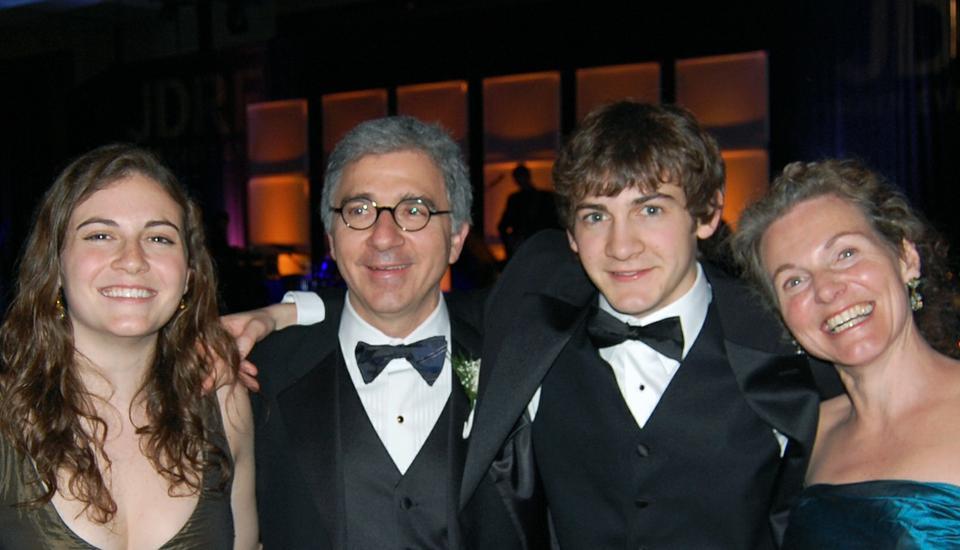
News
When Professors Speak Out, Some Students Stay Quiet. Can Harvard Keep Everyone Talking?

News
Allston Residents, Elected Officials Ask for More Benefits from Harvard’s 10-Year Plan

News
Nobel Laureate Claudia Goldin Warns of Federal Data Misuse at IOP Forum

News
Woman Rescued from Freezing Charles River, Transported to Hospital with Serious Injuries

News
Harvard Researchers Develop New Technology to Map Neural Connections
Eliot Masters Bring Scientific Expertise

The incoming Eliot House Masters—Life Sciences Professor Douglas A. Melton and educational consultant Gail A. O’Keefe—may be new to leading a House, but they already have their share of experience with House life.
Their daughter, Emily L. Melton ’09, was Quincy House Committee chair and introduced her parents to the quirks of Harvard’s House system.
The couple knows that perennial House debates revolve around stein club locations, planning for formals, and housing day t-shirt designs—they even have former Quincy housing day t-shirts in their home.
With this background, the two scientists eagerly anticipate embedding themselves in House culture, bringing with them their passion for their profession and their extensive experience with undergraduates.
SMOOTH SAILING
Melton and O’Keefe say they plan on enthusiastically and easily embracing House life.
“I think it will be very easy to fit into the social patterns there,” O’Keefe says.
The two say they plan to spend much of their time in the Eliot dining hall.
O’Keefe says she is a night owl but her husband is an early bird, so while she will chat with undergraduates in the dining hall at 1 a.m., he will cruise through the dining hall at 5:30 a.m.
Much of their confidence is due to their trust in the House staff and the foundation provided by outgoing Masters Lino Pertile and Anna Bensted, Melton says.
More broadly, the couple’s goal is to create a community where undergraduates can feel comfortable sharing their concerns with the couple, a culture rarely attainable in classes and office hours.
But despite their aplomb, dealing with administrative or disciplinary issues may be more difficult, they both acknowledge.
Still, Melton jokes that his biggest challenge will be learning the Eliot song.
“Gail knows I’m a terrible singer,” he quips.
BIOLOGICAL BACKGROUNDS
While singing may not be their forte, Melton and O’Keefe bring strong scientific backgrounds that complement each other’s areas of expertise. O’Keefe frames their studies as opposites, although both lie within the realm of biology.
While he studies small systems on the molecular level, she focuses on examining organisms, like bugs and birds.
“You’ll see we’re on opposite ends of the spectrum,” O’Keefe says. “We’re complementary.”
Born in Connecticut, O’Keefe did not stray far from home during her undergraduate years, majoring in Biology at the University of Connecticut with a focus on entomology, the study of insects. She also received her M.A. in Applied Developmental and Educational Psychology from Boston College.
Likewise, her husband, a Chicago native, majored in Biology at the University of Illinois at Urbana-Champaign. He continued his studies as a Marshall Scholar at Cambridge University, receiving a B.A. in History and Philosophy of Science and a Ph.D. in molecular biology.
Harvard’s House system mirrors Cambridge University’s College system, where students are divided into 31 Colleges where they live, eat, and socialize.
But Melton, a member of Cambridge’s Trinity College, says he prefers Harvard’s newer House system to the more formal Cambridge system, where students were required to wear full gowns in order to attend meals.
“This is much less formal and much more interactive,” he says of the Houses.
ENERGIZED EXCHANGES
The informal interactions Melton sees in the Houses are similar to the interactions Melton says he has in his laboratory, where undergraduates conduct cutting-edge research on stem cells alongside graduate students and faculty.
Although Melton is now known for his study of the pancreas and stem cells, he began his career examining frogs and embryonic development.
But when his son Sam was diagnosed with Type I diabetes, Melton entirely switched his focus from frogs to mammals, specifically studying the pancreas and diabetes.
Melton has extensive experience working with students in his laboratory, from thesis advising to writing medical school recommendations. He also teaches mainly undergraduate courses, including the popular bioethics course co-listed as Government 1093 and Life Sciences 60, which he co-teaches with Harvard Professor Michael J. Sandel, well-known for teaching Moral Reasoning 22: “Justice.”
“The undergraduates are so full of energy and excited about new things,” Melton says. “I find myself energized.”
Melton’s familiarity with students has given him a deep understanding of even some of the minute details of undergraduate life—for example, he has noticed that some students are completely free and relaxed during reading period, while others disappear and retreat to the libraries.
Their new roles as House Masters will enable the couple to further connect with the youngest students at Harvard—and they can’t wait to begin.
“When we started we liked the idea, but now that we’ve been asked to do it, September seems a long time away,” Melton says.
—Staff writer Danielle J. Kolin can be reached at dkolin@fas.harvard.edu.
—Staff writer Naveen N. Srivatsa can be reached at srivatsa@fas.harvard.edu.
Want to keep up with breaking news? Subscribe to our email newsletter.
